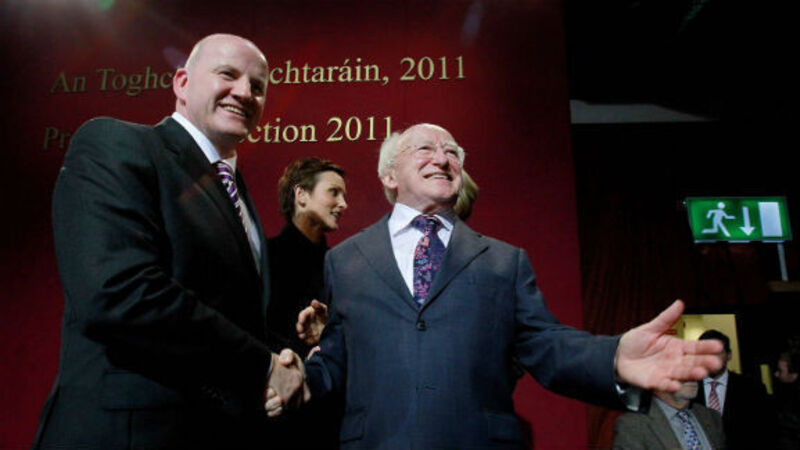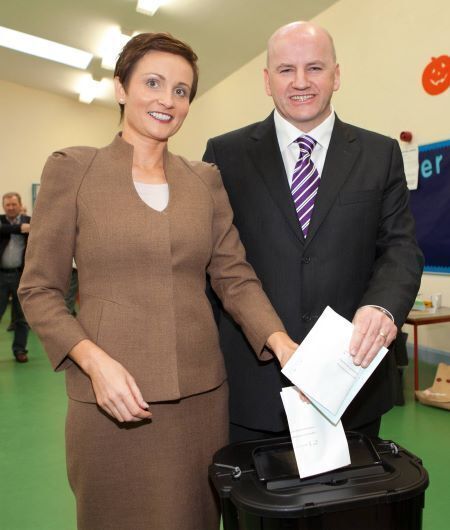Better control at RTÉ is probably poor comfort to Sean Gallagher

T THIS point in time it’s a headbend too far to try and imagine Sean Gallagher and not Michael D Higgins as the ninth President of Ireland. There was a time though when it looked as if the businessman was coasting his way to the Phoenix Park.
Probably the main difficulty in imagining a Gallagher rather than a Higgins presidency is that fact that Michael D has done such a good job since he was elected in November 2011.
Following on from the turbulence, heat and vitriol of that presidential campaign there seemed to be a general sense in the aftermath that the right thing happened when Michael D Higgins was elected, after he received 1m votes.
Conversely Sean Gallagher must have spent many days and nights pondering on what might have been. He was leading in the opinion polls, momentum was going his way. Many felt he would make a good president for the times we were in, that his “can do attitude” and entrepreneurial spirit would help get us out of the doldrums.
For many involved in politics though, and I think it’s fair to say for a number of journalists, he seemed far too arriviste and untested and they worried about the gravitas of the office of president being properly upheld. It’s interesting to remember that some months after the presidential election, when the controversy resurfaced, the current Taoiseach, and then minister, Leo Varadkar, said RTÉ had a bias towards centre-left parties and liberal views.
For some people it would be impossible to escape the bitterness of such an experience — to come so close to such high office only to have it snatched away. The businessman hopefully feels some comfort and vindication this week after receiving “substantial” damages and an apology from RTÉ after his legal action concerning the fake tweet read out during the final TV debate in the presidential campaign. It should be made known how much he was paid in the settlement given that citizens fund the station through the licence fee and their taxes.
Sean Gallagher’s complaint centred on the broadcasting of the tweet which purported to come from an official Twitter account of Martin McGuinness, the late Sinn Féin politician who was also running for the presidency. This account was fake.
He had also claimed that the programme featuring the election candidates was deliberately and unfairly edited and presented and directed by RTÉ in order to damage his electoral prospects.

RTÉ apologised and acknowledged that its production of the Frontine Presidential Debate “fell significantly short of the standards expected by the public and required by the law”. Listening back to their interaction that night it is striking how McGuinness outranked Sean Gallagher in terms of political debating experience, unsurprisingly so really given where he’d been and what he’d done over decades. But what was equally clear was a fact that had been obvious throughout the campaign and that was how Sean Gallagher had never managed to work out a way to present his “Fianna Fáil-ness”.
It’s difficult to imagine it now but in those dark days of austerity back in 2011 a candidate associated with Fianna Fáil could have gone on fire and the citizens wouldn’t have been moved to waste as much as a bucket of water to douse the blaze.
The businessman, running as an independent candidate, had protested all along that his attachment to the Fianna Fáil party did not run that deep, but showed the reluctance of a loyal son in failing to pin proper responsibility on the party for the economic crash. There was the added complication of a significant amount of his support coming from the “silent” Fianna Fáil vote which still existed.
Throw into that mix the fact the previous weekend the Mail on Sunday had contacted the candidate asking if he had called to the home of a Co Armagh businessman, on behalf of Fianna Fáil, and collected €5,000, several years previously. Sean Gallagher could not recall the episode and nothing was printed.
So the claim was in the ether when McGuinness raised it that Monday night saying he had been contacted by fuel merchant Hugh Morgan, a man who had strong Sinn Féin connections. He had said Gallagher had invited him to a Fianna Fáil dinner in Dundalk, with then taoiseach Brian Cowen, at a cost of €5,000 per head, and afterward had called to his house to collect the cheque.
The subject was raised on a first occasion when Gallagher denied, in a less than robust manner, that it was true. Following an ad break the debate convener Pat Kenny read out the by now infamous tweet, sent from the @mcGuinness4Pres account, saying: “The man Gallagher took the cheque from will be at a press conference tomorrow”.
Whatever harm had been done in the earlier exchange Gallagher compounded it by saying “if he gave me an envelope” and having “no recollection”. The use of such language, so reminiscent of the hubris of past disgraced Fianna Fáil politicians, caused a collective intake of breath all over the country.
A subsequent tweet by Sinn Féin’s official presidential account confirmed the earlier tweet had not come from an official party account. Despite the production team being aware of this new tweet well before the programme ended, it was never broadcast.
Compounding this in a very damaging way was the fact that the next morning Gallagher had a scheduled appearance on Kenny’s radio show and the tweet wasn’t clarified then either, and yet more damage was done to his candidacy.
It all seems an eternity ago now but it is worth recalling the sequence of what went on. It had been lost in the mists of time and when the settlement news broke on Tuesday the exact detail was difficult to recall. But Sean Gallagher deserves the proper recall of events.
Remember that RTÉ stood by its guns to begin with, and it was months rather than days before the broadcaster altered its position and admitted mistakes were made. In March 2012 the Broadcasting Authority of Ireland (BAI) upheld a complaint by the former presidential candidate on the broadcast and the subsequent Pat Kenny programme. I should declare, in the interests of openness, that my husband, a friend of Sean Gallagher’s, volunteered on the election campaign.
In his statement this week Sean Gallagher said his motivation in taking the case was not just about the unfairness shown to him but also about protecting the integrity of the democratic process and ensuring that what happened to him will not be allowed to happen again.
This is a very valid point. We must remember that what occurred during that infamous debate followed on from Prime Time’s Mission to Prey programme — both highlighting serious deficiencies in RTÉ’s editorial and other processes, which precipitated a period of serious crisis for the station.
It would appear that everything is operated on a far tighter and more transparent basis now — as it should be. That’s probably a poor comfort for Sean Gallagher. He waited a long time for his case to conclude, with his life, no doubt, in some ways on hold. He deserved his apology and payment.






